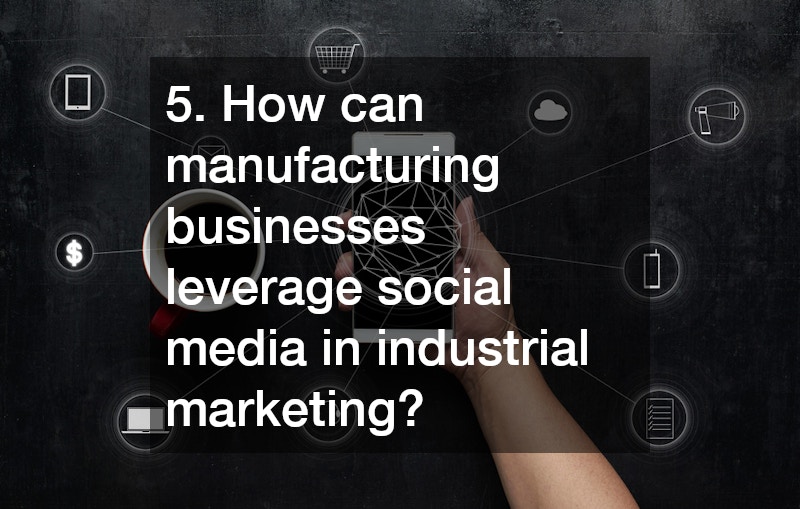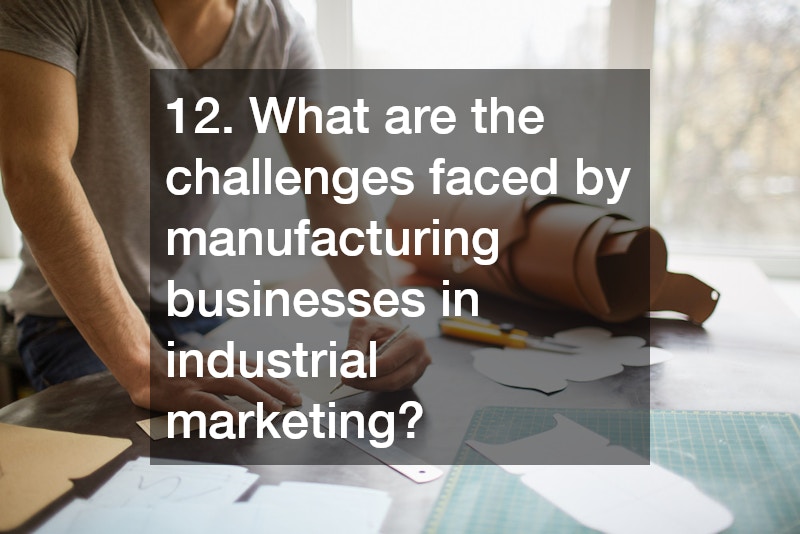Trends in Industrial Marketing for Manufacturing Businesses
Overall, trends in industrial marketing present exciting opportunities for manufacturing businesses to differentiate their brand, engage their audience, and drive business growth in the digital age by leveraging cutting-edge marketing strategies and best practices that resonate with industrial buyers and drive results effectively.
1. What is industrial marketing?
Industrial marketing refers to the promotion and selling of products or services to other businesses or organizations rather than individual consumers. For an industrial manufacturer, this type of marketing is crucial for reaching their target audience and generating leads effectively.
Industrial marketing involves developing strategies that cater to the specific needs and preferences of industrial buyers, which often requires a more technical and solution-oriented approach compared to consumer marketing. In essence, it is about creating value propositions that address the challenges and goals of businesses in the industrial sector.
Trends in industrial marketing play a vital role in driving business growth and establishing a competitive edge in the market. By effectively communicating the value of their products or services to potential customers, industrial manufacturers can build long-term relationships and secure profitable deals in the industry.

2. Why is industrial marketing important for manufacturing businesses?
Industrial marketing is crucial for manufacturing businesses because it directly impacts their sales performance and overall revenue growth. By implementing effective industrial marketing strategies, manufacturers can attract qualified leads, convert them into customers, and ultimately drive business success.
Furthermore, industrial marketing plays a key role in shaping the brand reputation of manufacturing businesses. A strong industrial marketing plan can enhance brand visibility, credibility, and trust among target customers, leading to increased market share and customer loyalty in the long run.
3. How has industrial marketing evolved in recent years?
In recent years, industrial marketing has undergone significant transformations due to advancements in technology and changing consumer behaviors. One of the most notable shifts is the increasing adoption of digital marketing strategies by industrial manufacturers to reach their target audience more effectively.
Moreover, data-driven decision making has become a cornerstone of modern industrial marketing, enabling manufacturers to analyze customer insights, predict market trends, and optimize their marketing initiatives for better results. This data-centric approach has revolutionized how industrial businesses engage with their audience and drive sales in a more targeted manner.
4. What are the current trends in industrial marketing?
The current trends in industrial marketing revolve around personalization and customer experience, highlighting the importance of tailored marketing efforts that resonate with industrial buyers. Industrial manufacturers are increasingly focusing on delivering relevant and engaging content to their target audience to build lasting relationships and drive sales.
Furthermore, there is a growing emphasis on leveraging social media platforms for industrial marketing, as they provide an effective channel to reach a wider audience, engage with customers in real-time, and showcase cutting-edge manufacturing solutions. By incorporating social media into their marketing strategies, manufacturing businesses can enhance brand visibility, generate leads, and stay ahead of the competition in the digital landscape.
In essence, the current trends in industrial marketing are centered around creating valuable, personalized, and seamless experiences for industrial buyers to address their unique needs and challenges in the industrial marketplace.

5. How can manufacturing businesses leverage social media in industrial marketing?
Social media has become an integral part of industrial marketing, offering manufacturing businesses a powerful platform to connect with their target audience, showcase their expertise, and build brand awareness in the industry. By utilizing social media channels such as LinkedIn, Twitter, and Facebook, manufacturers can engage with customers, share industry insights, and promote their products or services effectively.
For example, local boat manufacturers can leverage social media to showcase their latest boat models, share customer testimonials, and engage with boating enthusiasts to create a community around their brand. Similarly, coil springs manufacturers can use social media to demonstrate the quality and performance of their products, educate customers on the benefits of using coil springs, and attract potential buyers in the automotive industry.
In essence, social media presents a valuable opportunity for manufacturing businesses to connect with their target audience, drive brand awareness, and establish thought leadership in the industry through engaging and interactive content.
6. What role does content marketing play in industrial marketing?
Content marketing is a key component of various trends in industrial marketing, enabling manufacturing businesses to create informative and engaging content that educates, informs, and inspires industrial buyers. By producing high-quality content such as blog posts, case studies, whitepapers, and videos, manufacturers can showcase their expertise, highlight their products or services, and address the pain points of their target customers.
For example, an industrial construction union can use content marketing to demonstrate their specialized skills, showcase their successful projects, and offer valuable insights into the construction industry to attract new clients and partners. Likewise, an industrial storage warehousing company can create informative blog posts, how-to guides, and videos that educate customers on effective storage solutions, best practices, and industry trends.
In essence, content marketing plays a crucial role in establishing thought leadership, building credibility, and fostering customer relationships in the industrial sector, driving brand awareness and lead generation for manufacturing businesses.
7. How can manufacturing businesses utilize search engine optimization (SEO) in industrial marketing?
Search engine optimization (SEO) is essential for manufacturing businesses to improve their online visibility, attract organic traffic, and drive qualified leads to their website. By optimizing their website content, meta tags, and keywords for search engines, manufacturers can enhance their website’s ranking on search engine results pages (SERPs), increase their online presence, and reach a wider audience of potential customers.
For example, an industrial maintenance company can optimize its website content for keywords such as “industrial maintenance services,” “equipment maintenance solutions,” and “facility management services” to rank higher in search engine results and attract customers looking for industrial maintenance services online. Similarly, an industrial equipment relocation company can optimize its website for keywords such as ” heavy equipment relocation,” “machinery moving services,” and “industrial equipment transport” to target customers seeking equipment relocation solutions.
Overall, SEO is a powerful tool for manufacturing businesses to drive organic traffic, improve website visibility, and generate quality leads in the competitive industrial marketplace, enhancing their online presence and brand awareness effectively.

8. What are the benefits of using video marketing in industrial marketing?
Video marketing offers numerous benefits for manufacturing businesses, allowing them to engage their target audience, showcase their products or services, and drive conversions effectively. By creating informative and visually appealing videos that demonstrate their offerings, cutting edge manufacturing processes, and customer testimonials, companies can capture the attention of industrial buyers, communicate their value proposition, and stand out in the crowded industrial marketplace.
For example, a heavy equipment manufacturer can use video marketing to showcase the durability, performance, and features of their equipment, highlight customer success stories, and provide product demonstrations to educate potential buyers and build trust in their brand. Similarly, an industrial cleaning company can create video tutorials, before-and-after videos, and behind-the-scenes footage to showcase their cleaning services, highlight their expertise, and attract new clients in the commercial cleaning sector.
Overall, video marketing is a powerful tool for manufacturing businesses to enhance brand visibility, engage customers, and drive conversions by creating compelling and shareable video content that resonates with industrial buyers in the digital age.
9. How can manufacturing businesses leverage influencer marketing in industrial marketing?
Influencer marketing can be a valuable strategy for manufacturing businesses to build credibility, reach new audiences, and generate leads in the industrial sector. By partnering with industry influencers, experts, or thought leaders who have a strong following and influence in the industry, manufacturers can tap into their networks, leverage their expertise, and gain credibility and trust among their target customers.
For example, an industrial equipment manufacturer can collaborate with a renowned heavy equipment expert or industry influencer to endorse their products, provide expert insights, and engage with their audience to drive brand awareness and sales. Similarly, an industrial cleaning company can work with a reputable cleaning expert or influencer to promote their services, share cleaning tips, and attract customers seeking professional cleaning solutions.
10. What role does email marketing play in industrial marketing?
Email marketing is a valuable tool for manufacturing businesses to nurture leads, engage customers, and drive conversions through targeted and personalized email campaigns. By sending relevant and timely emails to their target audience, manufacturers can build relationships, showcase their products or services, and encourage action from potential customers to generate leads and sales effectively.
For example, an industrial equipment manufacturer can send personalized email campaigns to specific segments of their audience, highlighting new product launches, special promotions, and industry insights to drive engagement and conversions. Similarly, an industrial maintenance company can utilize email marketing to provide maintenance tips, service updates, and customer testimonials to educate their audience, foster loyalty, and drive repeat business in the industrial maintenance sector.
11. How can manufacturing businesses measure the effectiveness of their industrial marketing strategies?
Measuring the effectiveness of industrial marketing strategies is essential for manufacturing businesses to evaluate their performance, optimize their campaigns, and achieve their marketing goals effectively. By tracking key performance indicators (KPIs) such as website traffic, lead generation, conversion rates, and customer engagement, manufacturers can assess the impact of their marketing initiatives, identify areas for improvement, and make data-driven decisions to enhance their results.
Furthermore, utilizing tools and techniques such as Google Analytics, CRM systems, and marketing automation platforms can help manufacturing businesses track and analyze marketing metrics, generate reports, and gain valuable insights into the performance of their industrial marketing campaigns. By leveraging data and analytics, manufacturers can refine their strategies, allocate resources effectively, and maximize the return on investment (ROI) of their marketing efforts in the industrial sector.

12. What are the challenges faced by manufacturing businesses in industrial marketing?
Manufacturing businesses face various challenges in industrial marketing, including intense competition, rapid changes in technology, and evolving consumer behaviors that require them to stay agile and innovative in their marketing strategies to remain competitive in the market. With increasing globalization and digitalization, manufacturers need to adapt to new trends and technologies, such as automation, artificial intelligence, and digital marketing, to reach their target audience effectively and drive business growth.
Furthermore, industrial manufacturers must navigate complex supply chains, compliance regulations, and industry standards that impact their marketing efforts and require them to stay informed and compliant with best practices in the industry. Additionally, factors such as workforce shortages, fluctuating market demand, and economic uncertainties can pose challenges for manufacturing businesses in maintaining a competitive edge, attracting new customers, and driving sustainable growth in the industrial marketplace.
13. How can manufacturing businesses stay ahead of the curve in industrial marketing?
To stay ahead of the curve with trends in industrial marketing, manufacturing businesses can invest in ongoing training and education for their marketing teams to stay updated on the latest trends, technologies, and best practices in the industry. By empowering their teams with knowledge, skills, and resources, manufacturers can drive innovation, creativity, and efficiency in their marketing strategies to achieve competitive advantage and market leadership.
Moreover, embracing innovation and experimentation in marketing strategies can help manufacturing businesses identify new opportunities, test different approaches, and adapt to changing market conditions to stay agile, responsive, and relevant in the industrial marketplace. By exploring cutting-edge marketing techniques, such as artificial intelligence, virtual reality, and predictive analytics, manufacturers can differentiate their brand, engage their target audience, and drive sustainable growth in the competitive industrial landscape.
Overall, staying ahead of the curve with trends in industrial marketing requires manufacturing businesses to foster a culture of continuous learning, experimentation, and adaptation that empowers their teams to embrace change, drive innovation, and lead the way in shaping the future of industrial marketing effectively.
In conclusion, trends in industrial marketing for manufacturing businesses are evolving rapidly, driven by advancements in technology, changing consumer behaviors, and the need to stay competitive in the dynamic industrial landscape. By embracing digital marketing strategies, data-driven decision making, and customer-centric approaches, manufacturing businesses can leverage the power of industrial marketing to drive growth, build brand reputation, and stay ahead of the curve in the competitive marketplace.
Through personalized marketing efforts, social media engagement, content marketing strategies, and innovative marketing techniques, manufacturing businesses can connect with their target audience, drive brand awareness, and generate leads effectively in the industrial sector. By measuring the effectiveness of their marketing strategies, addressing challenges, and staying agile and innovative with trends in industrial marketing, manufacturing businesses can achieve sustainable growth and success in the rapidly evolving industrial marketplace.



